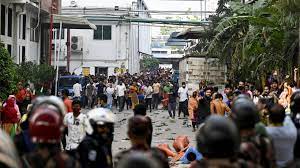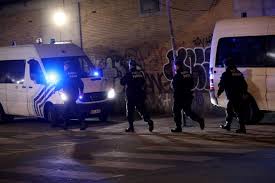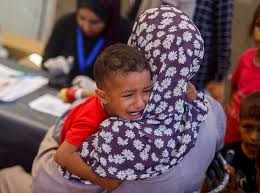
DHAKA (AFP): Bangladeshi garment manufacturers on Saturday shuttered 150 factories “indefinitely”, as police issued blanket charges for 11,000 workers in connection with violent protests demanding a higher minimum wage, officers said.
Bangladesh’s 3,500 garment factories account for around 85 percent of its $55 billion in annual exports, supplying many of the world’s top brands including Levi’s, Zara and H&M.
But conditions are dire for many of the sector’s four million workers, the vast majority of whom are women whose monthly pay, until recently, started at 8,300 taka ($75).
Violent protests demanding better pay erupted last month, with at least three workers killed and more than 70 factories ransacked or damaged since, according to police.
A government-appointed panel raised the sector’s wage by 56.25 percent on Tuesday to 12,500 taka, but garment workers have rejected the hike, instead demanding a 23,000 taka minimum wage.
On Thursday, 15,000 workers clashed with police on a key highway and ransacked Tusuka, a top plant, along with a dozen other factories.
– ‘Poverty wage’ –
“Police have filed cases against 11,000 unidentified people over the attack on Tusuka garment factory,” police inspector Mosharraf Hossain told AFP.
Bangladesh police often issue primary charges against thousands of people — without specifying their names — following large protests and political violence, a tactic that critics say is a way to crack down on dissent.
Human rights groups have previously warned such mass cases launched against thousands of unidentified people gives police the license to target innocent protesters.
Wage protests pose a major challenge to Prime Minister Sheikh Hasina, who has ruled the country with an iron fist since 2009.
A resurgent opposition has challenged her rule as she readies for elections due before the end of January.
Police told AFP that 150 factories had closed in the major industrial towns of Ashulia and Gazipur, both north of the capital Dhaka, as manufacturers feared further strikes when Bangladesh’s working week began on Saturday.
“The manufacturers invoked Section 13/1 of the labour laws and shut 130 factories at Ashulia indefinitely citing illegal strikes,” Sarwar Alam, head of police in the manufacturing hub, told AFP.
Ashulia is home to some of the biggest Bangladeshi factories, with some employing as many as 15,000 workers in a single multi-storied plant.
Police on Thursday fired rubber bullets and tear gas at around 10,000 workers in Ashulia when they attacked officers and factories with bricks and stones.
At least 20 factories were also shut down in Gazipur, which is the largest industrial zone in the country, said its police chief Mohammad Sarowar Alam.
The minimum wage protests over the past two weeks have been the worst in more than a decade.
The prime minister has rejected any further pay hikes for workers and warned violent protests could cost jobs.
“If they take to the streets to protest at someone’s instigation, they will lose their job, lose their work and will have to return to their village,” Hasina said on Thursday.
“If these factories are closed, if production is disrupted, exports are disrupted, where will their jobs be? They have to understand that.”
But unions staged protests defying Hasina’s warning.
They had dismissed the panel’s decision, because the pay hike does not match the soaring cost of food, rent, healthcare and school fees for their children.
The Netherlands-based Clean Clothes Campaign, a textile workers’ rights group, has dismissed the new pay level as a “poverty wage”.
Washington has condemned violence against protesting workers.
The United States, which is one of the largest buyers of Bangladesh-made garments, has called for a wage that “addresses the growing economic pressures faced by workers and their families”.






